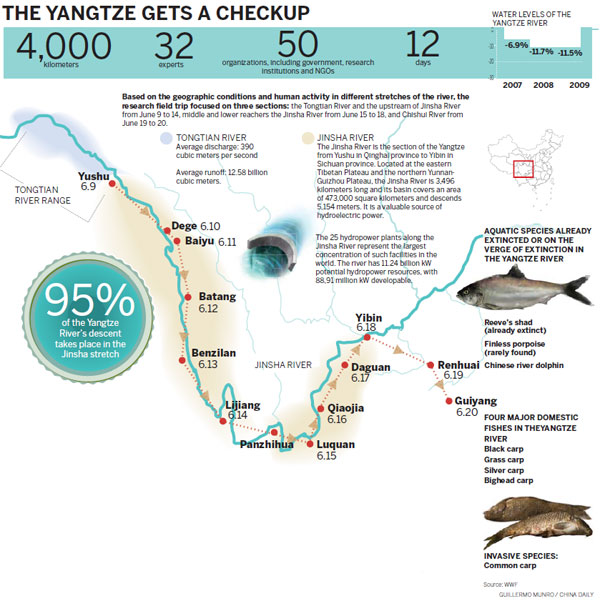Fish ecosystem on Yangtze 'on verge of collapse'
 0 Comment(s)
0 Comment(s) Print
Print E-mail China Daily, August 16, 2013
E-mail China Daily, August 16, 2013
 |
Chen Jiakuan, a professor at Fudan University in Shanghai who participated in the research expedition, said that 450 million metric tons of sand flowed downstream in the Yangtze in the 1950s, compared to 150 million tons at present.
"The sand is silting up at reservoirs, leading to the degradation of water quality. It also changed the environment for fish," Chen said.
Hydroelectric power plants also change water temperatures and a river's flow, which damages native plants and animals in the river and on land, he said.
As for overfishing, experts said 100,000 tons of fish caught in the Yangtze is an amount beyond what its ecosystem could take.
An annual three-month moratorium during the fish spawning period on the Yangtze River is far from enough for fish reproduction, Zhao said.
"The best way is a total ban on fishing," he said.
But he said the policy is hard to implement as it involves a lot of issues such as compensating those who live on fishing.
He suggests establishing a department coordinating different interest groups to solve the problem.
"The department should be responsible for drafting compensation plans to ensure the fishing ban is effective."
As the Yangtze River basin covers 19 provinces and cities, accounting for 18.8 percent of the land area in China, saving the river and its fish resources is not an easy task.
New legislation is needed to raise public awareness, the report said.
Ren Wenwei, head of the Shanghai conservation program of WWF, said the current regulations are not enough.
"The Yangtze River Fishery Resources Committee is a vice-ministry level department, which has limited power to coordinate different interest groups," he said.
He and other scientists propose drafting a Yangtze River Basin Management Act and establishing a coordinating department directly under the State Council.






Go to Forum >>0 Comment(s)